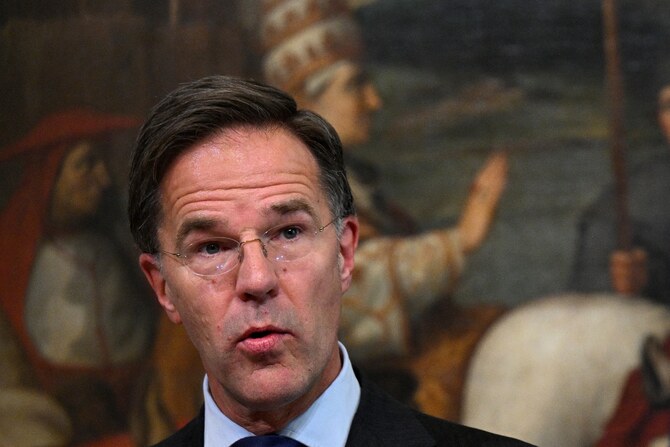BRUSSELS: US allies at NATO scrambled Wednesday to put a brave face on the return of Donald Trump to the White House amid fears the unpredictable Republican could upend European security and pull the plug on Ukraine support.
Trump sealed a dramatic comeback to power after sweeping to victory in the US presidential election against Democrat Kamala Harris.
NATO chief Mark Rutte — chosen recently in part due to his good relations with Trump — was quick to congratulate the victor and played up the positive impact he could make.
“His leadership will again be key to keeping our Alliance strong. I look forward to working with him again to advance peace through strength through NATO,” Rutte said.
But beneath the veneer of calm, there remains deep disquiet about what Trump could do to European security as an aggressive Russia wages war on Ukraine just beyond NATO’s border.
The volatile former reality TV star rattled NATO during the campaign by saying he’d encourage Moscow to “do whatever the hell they want” to members not spending enough on defense.
Senior diplomats at NATO, speaking on condition of anonymity to discuss sensitive issues, sought to put a positive spin on his return for a second term, saying it could push Europe to get serious about protecting itself.
“Why be scared by Trump now? It is going to be rough, but at least he will pump some energy into the whole thing,” one diplomat said.
Trump’s first term in power was a rollercoaster for NATO as the bulldozing president lambasted European allies such as Germany for weak defense spending and reportedly even mulled pulling Washington out.
But officials said that not only did the alliance survive — it actually emerged stronger as Trump and his no-holds-barred style pressured Europe to spend more.
“During his first term, our working relationship focused on bolstering transatlantic security and adapting NATO for the future. In a world of growing instability, strong US leadership remains essential,” former NATO head Jens Stoltenberg wrote on X.
Analyst Camille Grand of the European Council on Foreign Relations said there are “two theories” on how a second Trump term could go for NATO.
“One is that it will be like the first time, unpleasant but not catastrophic,” he said.
“Or, we are today in a different world with a Trump entourage who are unwaveringly Trumpist, who share his doubts about alliances, support for Ukraine; and especially during the first mandate there was no war in Europe.”
In a bid to appeal to Trump, NATO leaders have sought to repeatedly credit him with making other allies cough up more on defense.
The urgency on spending in Europe was ramped up by Moscow’s 2022 invasion of Ukraine and now 23 of the 32 NATO members reach the target of spending two percent of gross domestic produce on defense — up from just three a decade ago.
Now the feeling is that Europe will have to do even more to make sure it can stand on its own.
“I expect a serious push to finally start taking our security and defense in Europe seriously, to invest much more, to finally do it,” said one former senior NATO diplomat.
But the ex-official warned to expect more rhetoric from Trump questioning Washington’s commitment to NATO’s collective defense clause that would “undermine security” and could embolden Russia and China.
For Ukraine, already struggling to hold back the Kremlin’s forces on the battlefield, the picture appears grim.
Trump has cast doubt on continuing US military support for Kyiv and promised to cut a quick deal with Russian President Vladimir Putin to end the war.
“If Trump starts negotiations with Russia, it will be very transactional, not built on values and principles — and this may lead to a result that would be catastrophic for Ukraine and for the whole of Europe,” the former diplomat said.
Other officials agreed that Ukraine was in a perilous position, but said Trump coming to power could give Ukraine’s President Volodymyr Zelensky the cover to make hard compromises.
And if Putin pushes for too much he could find the notoriously whimsical Trump far from pliant — and even willing to back Kyiv harder if the Kremlin doesn’t give ground.
“The Russians always make exaggerated demands,” said the first NATO diplomat.
“If they annoy Trump too much, they will get something in return they weren’t counting for.”



























